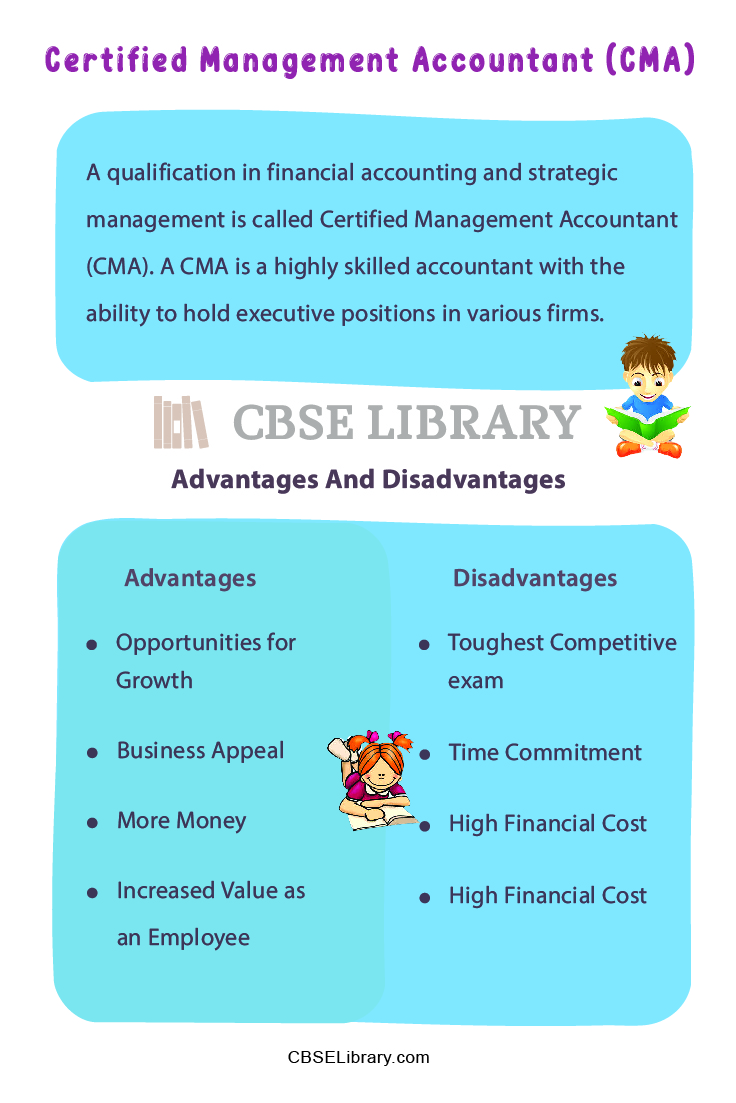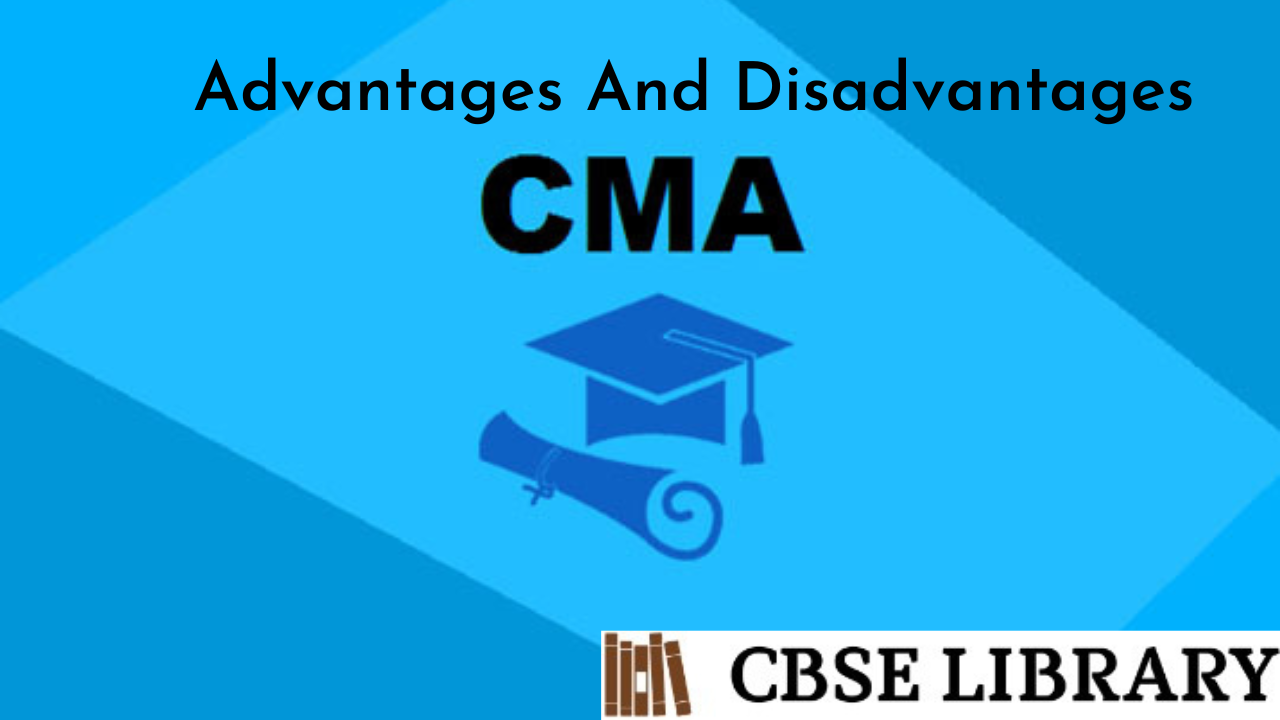CMA Advantages And Disadvantages: A qualification in financial accounting and strategic management is called Certified Management Accountant (CMA). Additionally, unlike a globally recognized certificate with an emphasis on managerial accounting and corporate finance. So before we get into how CMA might advance your career, it can be helpful to have a quick overview of the field.
The Institute of Management Accountants provides this professional credential (IMA). The IMA division, known as the Institute of Certified Management Accountants (ICMA), is responsible for granting CMA certification. Additionally, IMA is based in New Jersey and operates in over 140 nations.
Nearly a century ago, in Buffalo, New York, in 1919, the organization, then known as the National Association of Accountants, was established. Later, the organization’s name underwent a few changes until being changed to IMA in 1991 to emphasize the role played by accountants and other financial experts who work for companies. Through its demanding certification exam, IMA has expanded the CMA credential and set a high standard for management accounting professions for more than 40 years.
Students can also find more Advantages and Disadvantages articles on events, persons, sports, technology, and many more.
What is CMA? What are the Advantages and Disadvantages of CMA?
A CMA is a highly skilled accountant with the ability to hold executive positions in various firms. People who have earned a CMA certification can use their knowledge of accounting and financial management to influence business initiatives daily.
A CMA can engage in consultative roles and exercise leadership in high-level positions, unlike public accounting, where a CPA will place a heavy emphasis on compliance, taxes, or auditing. In a boardroom or when leading an accounting department, a CMA’s expertise in finance will give them a significant voice.
- Advantages of CMA
- Disadvantages of CMA
- Comparison Table for CMA Advantages And Disadvantages
- FAQ’s on CMA Advantages And Disadvantages
Eligibility Criteria for CMA course
You need to be aware of the prerequisites for enrollment in the CMA course before applying. The following are the requirements for enrollment in the CMA program:
Fundamental Course
- An applicant must have earned a Class 10 diploma or its equivalent from a recognised Board or Institution.
- Has passed the Senior Secondary Examination under the 10+2 Scheme of a recognised Board or an Examination recognised by the Central Government as equivalent thereto; or has passed the National Diploma in Commerce Examination held by the All India Council for Technical Education, or any State Board of Technical Education operating under the authority of the said All India Council; or the Diploma in Rural Service Examination administered by the National Council of Higher Education.
Intermediate Course
- Passed the Senior Secondary School Examination (10+2), the Institute of Cost Accountants of India Foundation Course, or graduated from any discipline other than the fine arts (Entry Level) Part I of the Institute/CAT Foundation’s exam (Entry Level) Examining Part I Competency Level Part II of the Institute’s CAT exam.
- Passed 10+2 and ICSI Foundation/ICAI Intermediate, or whatever name was called.
Final Course
- Completed 15 months of practical training after passing the Institute’s Intermediate course.
Advantages of CMA
Business Appeal:
The CMA certification’s key advantage is that it is regarded as the most significant accounting certification for management because it perfectly combines business and accounting. Candidates who have earned the CMA certification can thus make decisions for the firm or participate in group decisions. Corporate governance and other crucial commercials, financial, and accounting topics, such as responsible accounting, are covered in detail in the CMA program.
Candidates for this certification must understand the distinction between accounting and profitable and efficient accounting. They are given prominent jobs in an organization because businesses trust their business judgment. Consequently, obtaining a CMA certification will improve your marketability.
Opportunities for Growth:
The CMA is a management-level certification that offers numerous growth opportunities. It was discovered that CMA candidates have excellent entry-level jobs and possibilities for promotion compared to college graduates without any extra qualifications or just CPA certifications. The CMA credential signals that you intend to manage the accounts and take on additional duties in addition to accounting. Like other applicants, you can advance into management positions more swiftly with a CMA certification than without it.
More Money:
For the majority of professionals, money is what drives them most, so why not you? You are qualified for more significant compensation than other applicants if you obtain a CMA certification. Recent studies have shown that applicants with a CMA certification earn up to 67% more than those with only a degree or a CPA certificate. Compared to 2016 data, this has significantly increased. The earning potential is considerably higher when perks like health insurance, pensions, and fringe benefits are considered.
This is because CMA-certified candidates advance into management more quickly after gaining experience. Even when they change positions, they receive a more significant raise due to the high demand for CMA-certified candidates in the labor market.
Increased Value as an Employee:
The CMA program gives you a better understanding of accounting, finance, and business. As a result, you don’t just do a task; you also comprehend its purpose and look for ways to complete it quickly and effectively to deliver a better outcome than anticipated.
The key questions will start coming to you. You will be respected for your perspective and quickly integrated into the management. Candidates for CMA certification who later became CFOs. Because of this, having a CMA certification will increase your value as an employee and ensure that you always receive the respect you deserve.
Disadvantages of CMA
- Toughest Competitive exam: CMA (USA) would have a difficult time competing with Chartered Accountants(ICAI), which offers a demanding Course on par with the CMA.
- Time Commitment: It will take a lot of time to become a CMA. Both educational and professional standards must be met. Two exams that you must prepare for and pass must also be taken; you have three years from the start of the programme to do so. After becoming a CMA, you are required to do 30 hours of CPE every year.
- High Financial Cost: Obtaining your CMA entails paying for the following expenses:
- Depending on whether you are a student, academic, young professional, or professional, the annual IMA membership fee ranges from $45 to $275.
- The $250 programme enrollment fee for the CMA is waived for students and academic members.
- 3 CMA exam prices are $460 per part, while students and academic members pay only $345 per part.
- Test preparation materials, such as an online self-study course or an online self-study course combined with textbooks and access to an online test bank, may cost extra money.
- Demotivation: As it is one of the toughest competitive exams, it becomes difficult for a lot of people to clear at once, due to which they feel demotivated.

Comparison Table for CMA Advantages And Disadvantages
| Advantages | Disadvantages |
| The MNCs are expanding internationally, and job possibilities are likewise without borders. | The cost of obtaining the CMA certification is high in terms of time and money. |
| Home countries would also provide a variety of opportunities as rich nations opened operations in developing nations, giving CMAs a boost. | It could be more expensive to purchase exam preparation resources like an online self-study course or an online self-study course that includes textbooks and access to an online test bank. |
| The CMA (USA) Quality Standards would contribute to the development of governance rules. | Since it’s one of the hardest competitive tests, many people find it challenging to pass it all at once, which demotivates them. |
| The development of the CMA’s career would be a direct outcome of the expansion and prosperity of the corporations. | If you’re expecting a normal accounting career in a position that doesn’t require a certification of this level, it might not be viable to invest so much time and money to obtain it only for the bragging rights. |
FAQs on CMA Advantages And Disadvantages
Question 1.
What is the full form of CMA?
Answer:
The full form of CMA is Certified Management Accountant
Question 2.
Who grants a CMA certificate?
Answer:
The Institute of Management Accountants, a global organisation with a long history of ensuring members maintain high professional standards, awards the CMA certification. Successful candidates have a demonstrated skill set in areas like corporate investing, leadership, budgeting and forecasting, risk management, and even analytics and IT.
Question 3.
Is CMA a good idea for the future?
Answer:
Getting a CMA certification is a wise career choice, especially if you want to succeed in the management accounting industry.
Question 4.
Is the CMA exam challenging?
Answer:
The CMA exam is incredibly challenging and will push you to the edge of your knowledge. Less than half of test-takers will pass, according to the industry average CMA pass rate of only 45% for both portions. The CMA test is well known for being rigorous and challenging, therefore you should study if you want to pass.
